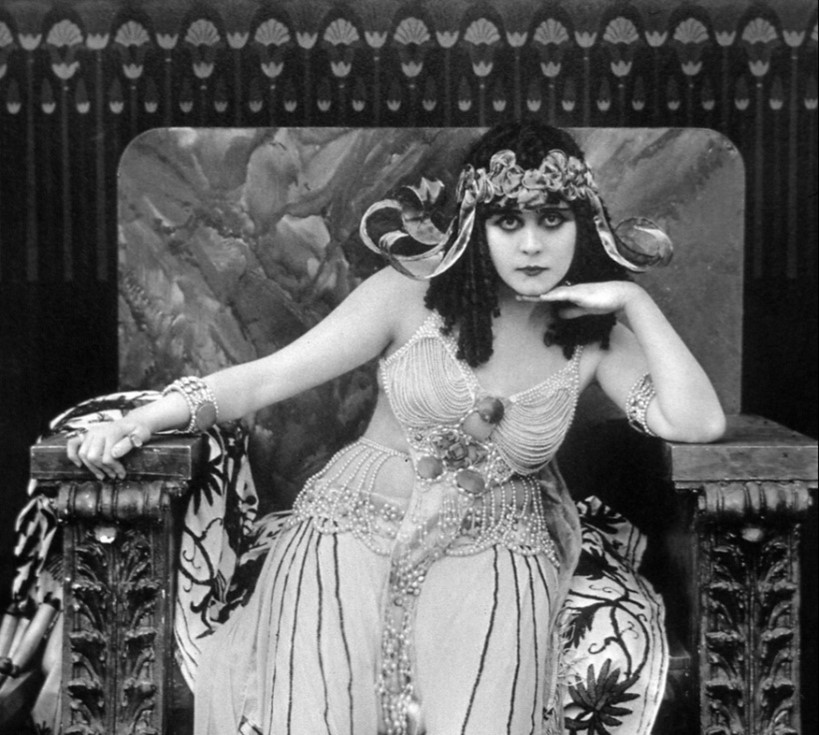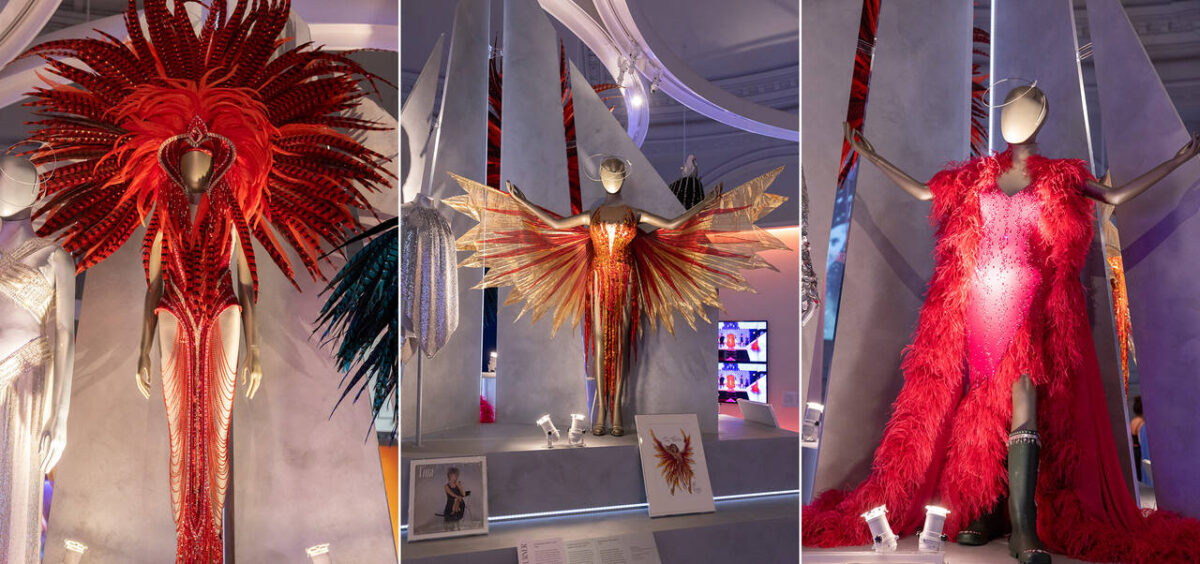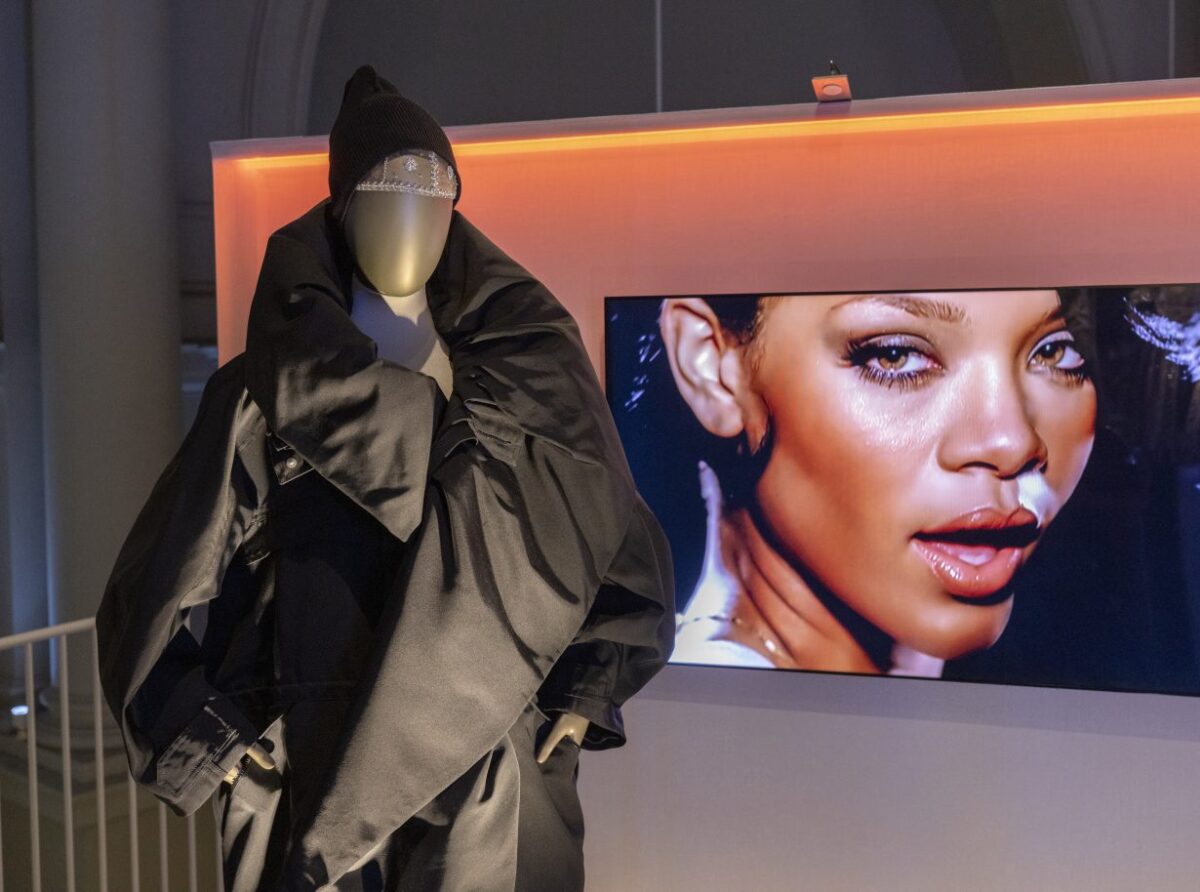Where does the overused word Diva come from? It was derived from the Italian for a female deity, or goddess, and closely associated with prima donna. It emerged in the early 19th century, when many leading sopranos became so famous and celebrated that they almost became goddess-like in the eyes of their adoring public (the divine singer).
The Victoria and Albert Museum has a proven track record of putting on audio-rich exhibitions. There have been great shows in recent years on the history of opera and the Rebel 60s. As you walk by the display, it automatically plays the linked music or spoken text. No more wires, little ear plugs, or screen numbers to manipulate; just these super wifi headphones, included in the price of the show.
Diva is divided into two sections, dubbed acts. Act I takes you back to the origin of great female theatre or opera stars during the nineteenth century. We can see the portraits, theatre bills, and gorgeous outfits. The high-brow theatre and music hall both had their divas. Stars like Ellen Terry and Marie Lloyd stood up for their rights even then, supporting suffragettes and decent pay for performers. Remember, a woman being on the stage, either in a music hall, theatre, or opera, was still seen as damaging to her femininity, moral standing, and social status? Don’t put your daughter on the stage. Mrs. Worthington was a popular Noel Coward hit, but there was a material basis for that warning. The musical hall stars stretched the limits of what women could say with their saucy innuendos. Burlington Bertie was a song about an upper-class swell down on his luck who was played as a man by Vesta Lilley and Ella Shields. Women were cross-dressing on stage.
Remember, a woman being on the stage, either in a music hall, theatre, or opera, was still seen as damaging to her femininity, moral standing, and social status?”

The Rise of the Divas
Video clips are shown from the silent era with Greta Garbo, Theda Barra, and Lyda Borelli. Mae West, Katherine Hepburn, Gloria Swanson, Bette Davies, and others follow the so-called talkies in black and white. Technicolour reveals Elisabeth Taylor as Cleopatra, telling Richard Burton to kneel before her regal power. Marilyn Monroe sings to Jack Lemmon and Tony Curtis’s accompaniment in Some Like It Hot.
We learn about how the Hollywood studio system tried, and succeeded for a long time, to totally control the public and private personas of these stars. Juicy personal stories were leaked to the press to spice up their notoriety. Even then, some were strong enough and sometimes successful enough to take back some control. Mary Pickford got her name on the studio sign, and Katherine Hepburn got to produce the movies she directed. Ida Lupino was the first woman to get control of the camera.
A selection of twentieth-century opera stars like Maria Callas and Jesse Norman are then featured. You can hear a sublime tape of Callas singing Bellini’s Norma.

Diva Goes Pop
Moving up a floor, we lose the theatre, films, and TV and discover Act II, which goes from about the seventies and is entirely taken up with the great singing stars of rock and pop—right up to the present day. Most stars have some costume or dress displayed that they have worn at historic concerts. Trans, gay, and bisexual artists are identified and lauded. The particular relationship between the LBGT+ community and these divas is mentioned throughout. Some of the stars, like Madonna or Lady Gaga, responded by campaigning for this community over HIV/AIDS or their rights in general.
A tragic end through suicide or overdose makes their Diva status more dramatic. Whitney Houston, Amy Winehouse, Marilyn Monroe, and Janis Joplin all died too young. Perhaps the proof of your status as a diva is only really confirmed if the fanbase remains strong long after you are dead. One of the problems with generalising the label to all the great artists who are featured in Act II is that the diva status becomes a little diluted. Can you really compare Lizzo or Debbie Harry with Edith Piaff or Judy Garland? Maybe such comparisons are a bit silly. Generally, the women divas in the second section are stronger, more independent, and in control of their artistic output compared to those stars of the earlier twentieth or nineteenth centuries.

I also found some of the generalisations about all these stars challenging conventions, defending feminism, and being progressive rather simplistic. It is one thing for Madonna to support gay rights, but her struggle is quite different from the one that faced some of the black divas featured in the show. Miriam Makeba, Ella Fitzgerald, Aretha Franklin, Nina Simone, Billy Halliday, and Jaqueline Baker all had to face a qualitatively different battle to succeed against white, often racist entertainment bosses. Their political engagement cost them more in terms of their careers and emotional stress compared to, say, Lady Gaga or Annie Lennox. Franklin and Simone put themselves on the line, marching with the Civil Rights marchers and Martin Luther King in the 1960s. Joan Baez, a true troubadour of the Left and progressives everywhere, has a small slot and a picture. I wonder what she would think about being submerged in all the bling and razzmatazz of this show.
I also found some of the generalisations about all these stars challenging conventions, defending feminism, and being progressive rather simplistic.”
If you compare the displays of these black singers, Baker apart, they did not wear the super-sexualized, revealing costumes of Beyonce, Tina Turner, or Lady Gaga. You have to factor in the way in which the production companies, the managers, and perhaps the artists themselves still pander to the male gaze in order to sell their music. It seems you have to have an outrageous video showing a lot of flesh to promote your work. The commoditisation of the music industry and the huge amounts of money that go to the ‘successful’ minority we see here are down to how the market works in a global economy.
The Politics of Divahood
This is an obvious economic difference from the diva stars portrayed in the first half of the 20th and 19th centuries. Some of those divas did make a lot of money, but not on the same scale and not on a global basis. The contemporary divas’ challenge and empowerment the show keeps discussing do not extend to even a mild questioning of how the corporate music industry is organised or how we could change it to encourage artistic production for millions of other artists who currently lose out. These contemporary divas charge ticket prices for their concerts, which must exclude large parts of the population. It is almost as if the hard politics are ghettoised in the segment given over to black or African activists on civil rights or Apartheid.

Ru Paul, the TV drag queen, on one screen makes a revealing comment regarding the dresses: You are born naked and then get dressed by Bob Mackie. Mackie made those dresses for Cher. Paul is being outrageous, but it is unconsciously somewhat of a commentary on aspects of this show. Is it cultural snobbery to say Maria Callas, a true diva, or Joan Baez did not have to rely so much on their costumes?
Despite these criticisms, the show is still a very pleasant way to spend a couple of hours. There is not a lot of nuance in the accompanying texts, and nearly anybody with a few hits has been promoted to diva status. Film, theatre, or opera stars who are possibly classable as divas in our era are strangely absent from the popular music-dominated Act II—Sofia Loren, Judi Dench, or Angela Gheorghiu, anyone? But you can enjoy listening to the greatest hits and seeing these extravagant costumes up close.
Today, celebrity culture in sports and entertainment occupies more space in people’s lives. It is reported that the Taylor Swift tour has a direct impact on a country’s GDP! As leisure time has increased and the standard of living has risen over the last 50 years, there has been a massive increase in passive consumption of corporate-produced culture and sport. A decline in amateur or semi-professional production of or participation in culture or sport in local clubs or communities has accompanied this. Given the way the twenty-four-hour broadcast, press, and social media spectacle operates, you get an elision or overlap between politics and celeb culture. A dumbing down of politics combines with an increase in cultural and sports personalities taking a stand on political or human rights issues. We see this in football with the Rashford (food bank) and Lineker (refugees) controversies.
Political activity and engagement have become dominated by individualisation—what is your party’s offer to me or my demographic as isolated, fragmented consumers of the political spectacle? Celebs bare all through social media, and politics takes place more and more in a virtual world of tweets. Political leaders are judged more on their personalities and back stories than on their policies. Meetings and serious discussions, whether in person or in the media, are devalued or marginalised. The new Starmer apparatus shuts down meetings and local parties that are troublesome, and business is conducted in bureaucratically controlled Zoom meetings. Members are used as fund-raisers or canvassers at elections, but their demands and concerns are disregarded at conferences or in policy-making. Rachel Reeves can change a party position on the green energy project or on banker bonuses from one TV appearance to the next. Political leaders and movements emerge from the world of business or entertainment outside of the traditional political parties, like Berlusconi, Trump, or Milei. A big media backer is, of course, crucial to this trajectory.
So the exhibition, as pleasurable and consumable as it is, fails to question the exponential growth of divaism and fails to point out any dangers or risks to how our society functions. Instead, it tends to overestimate the political engagement of these celebrities and underestimate the toxicity of celebrity culture and obsessive fandom. Often, star ‘commitment’ is similar to those celebs getting involved in big charity initiatives like Live Aid or Comic Relief. Declarations and actions on gay rights are fine, and we welcome them, but they merge into a sort of well-meaning non-governmental organisation (NGO) or charity gig.
Often, star ‘commitment’ is similar to those celebs getting involved in big charity initiatives like Live Aid or Comic Relief. Declarations and actions on gay rights are fine, and we welcome them, but they merge into a sort of well-meaning non-governmental organisation (NGO) or charity gig.”
So the other day (January 31st) Lenny Henry was on BBC Breakfast TV promoting the upcoming Comic Relief Day. He did talk about relief in terms of dealing with inequality and deprivation here and internationally. Money is also often given to worthwhile projects organised by communities. He recognised people’s basic generosity and concern for each other, implicitly challenging the callousness of the hard right, which claims a fake concern for ‘our own’ people.
However, he then said that once we, i.e., the Comic Relief celebs, point the British public in the right direction, then they respond. In other words, all this generosity is filtered through the control and direction of the celebs. Politics and serious analysis are eliminated. Henry half grasps the systemic contradictions of the spectacle when he recounts how he stopped the heartbreaking filming of the story of two children living in a shanty in Africa and switched to actually finding them better accommodation. Of course, the irony of the munificent benefactor from the West being played by a black guy was lost on him.
Nobody should oppose celebrities or divas who make progressive statements and give money to defend human or gender rights. Every little helps. But let us have no illusions about how fundamental a shift this is or how it can reproduce and reinforce the personalisation and de-politicisation of our society.
Sky News, which usually provides more hard news in the morning than BBC Breakfast, has just spent five minutes discussing the alleged conspiracy of Taylor Swift, who is supposed to be fixing the Super Bowl result since she is singing there and has a partner in the Bills team, and at the same time promoting Biden’s candidacy. It really says it all about where we are.
Tickets for Diva can be purchased here.
Art Book Review Books Campism Capitalism China Climate Emergency Conservative Government Conservative Party COVID-19 Creeping Fascism Economics EcoSocialism Elections Europe Far-Right Fascism Film Film Review Fourth International France Gaza History Imperialism Iran Israel Italy Keir Starmer Labour Party Long Read Marxism Marxist Theory Migrants Palestine pandemic Police Protest Russia Solidarity Statement Trade Unionism Trans*Mission Ukraine United States of America War

